Entertainment
The Colorism of Race: Bill Duke
by Mary L. Datcher
Special to the NNPA from The Chicago Defender
Bill Duke is one of America’s most prolific actors and directors as he continues to capture the topics that challenge people to think consciously on social issues. His latest project, Light Girls, is a documentary film and book as a follow-up to his Dark Girls film based on the serious problem of skin color discrimination within certain ethnic cultures — specifically the African American community.
Having a distinguished and long career that has brought him from his hometown of Poughkeepsie, New York to studying drama at Boston University and continuing further instruction at New York University’s Tisch School of the Arts and the American Film Institute, Duke launched his professional career on Broadway. Among some of his more notable roles were the imposing, conscious character Abdullah Mohammed Akbar in the movie Car Wash, as well prominent roles in Menace II Society, Exit Wounds, X Men: The Last Stand and Get Rich or Die Tryin‘. But it is his talents as a director that continue to keep him on speed dial with many production companies and film studios.
Duke is considered one of the most sought-after directors to capture and bring stories to life regardless of race, gender or cultural definitions; he is the actor’s director and the director’s director. His directorial work has spanned from the critically acclaimed television series Hill Street Blues and Miami Vice to feature films such as A Rage in Harlem, Hoodlum, Deep Cover, and Sister Act 2: Back in the Habit along with the PBS broadcast documentary Prince Among Slaves.
Duke was in Chicago to showcase his films Light Girls and Dark Girls along with participating in very in-depth panel discussions about the topics during the Black Women’s Expo last month.
CD: What was the motivation behind doing the films Light Girls and Dark Girls? It has been something that has been a taboo topic in the African American community. What made you feel it was necessary to tell this story?
BD: Based on my own experience as a young man coming up in Poughkeepsie, NY being dark complexioned and being tall, it was difficult. Luckily I had parents that re-enforced my worth to me. Early on, it was not easy for my sister, my mother and my niece. Some of the things they and other young girls went through from the community. Also, seeing the ‘colorism’ in our community today, it said to me, ‘This needs to be given a voice.’ As a result, I put together the two films and a book.
CD: Are you looking to do a third film as a follow up to Light Girls and Dark Girls?
BD: I’ve exhausted this territory. The next film is going to be called What is a Man? Is there a distinction between being born male and becoming a man? Many people feel there isn’t a distinction; you’re born male so you’re a man. In African tradition, that was not true. At 12 or 16 years old, you were given a spear and sent into the jungle. If you came back, there was a male ceremony with all other men who accepted you into the tribe. There’s a distinction between having a child, fathering a child and providing for that child. We want to examine that phenomenon. Is there such a thing called ‘manhood’? Are there manhood responsibilities? What are those responsibilities? Have they changed? Have they evolved? Also, what is the impact on those children of men that have several women who have borne their children?
CD: What motivates you to give back and mentor young people?
BD: It’s not our obligation, it’s our responsibility as Black men. The suffering of our young men due to lack of exposure to values and opportunities. The solution to that problem can’t be placed upon the shoulders of a system that has ignored them for many years.
We’re playing checkers in a chess game. Society is chess. We’re waiting for the chess players to come and teach us how to play chess. Those of us who learn how to play chess have to teach other people how to play chess. You can’t compete if you don’t have the information, knowledge and techniques for competition. So, it turns into complaints, violence and frustration. It’s a little frustrating and disturbing.
CD: Do young actors and filmmakers of color need to know how to play chess in order to compete and survive in Hollywood?
If you come to Hollywood and you are dreaming of having aspirations without understanding what is called ‘show business,’ you may get very, very lucky. That’s not what I see; I see the majority Black, Hispanic and Asians coming to Hollywood end up in positions that never lead them to their career. It’s an extremely competitive, rejection business. People hide the pain of rejection by dealing with the symptom which is usually through drugs, alcohol, partying or other activities that don’t deal with the root of the problem. Right now, the kids I see coming to Hollywood have no clue. They think we’re in the film and television business. We’re in the ‘media business.’
Duke immediately returns to the Windy City to begin filming, “Blaxicans” from mid-April to the end of May.
“It’s about a Mexican family and Black family where the young Black man falls in love with the Mexican girl. They get married and have a baby and she’s a “Blaxican.” The problem is that the father of the Black family hates Mexicans and the father of the Mexican family hates Black people. It’s a conflict between those two cultures while the wife, child and husband love each other and love their families. It’s how they resolve these issues; it’s a dramedy.”
It was just recently announced that Duke would be working on the biopic of the gospel legend Mahalia Jackson and filming in Chicago. Currently, the director is in discussions with potential investors to bring the gospel singer’s celebrated life to the big screen.
Duke reveals his admiration, “Not only was she close friends with Dr. Martin Luther King, Jr., but she encouraged him to do the “I Have a Dream” speech at the march. She was one of the first brilliant Black business women in this country. Although, it was a male dominated culture and society, she let no man tell her what to do. She stood up for women’s rights and her rights. Her story should be celebrated. It’s not a Black story. It’s a story of a woman — a human being — that grew up in the rural South with nothing. She believed in God enough that her faith brought her through circumstances that the average person could not survive. You can feel through her music.”
Arts and Culture
Promise Marks Performs Songs of Etta James in One-Woman Show, “A Sunday Kind of Love” at the Black Repertory Theater in Berkeley
“The (show) is a fictional story about a character named Etta, aka Lady Peaches,” said Marks. “She falls in love with Johnny Rhythm, leader of the Rhythm Players Band and headliners of Madam G’s Glitta Lounge.” Marks channeled the essence of Etta James, singing favorites such as “Sugar on the Floor” and “At Last.”
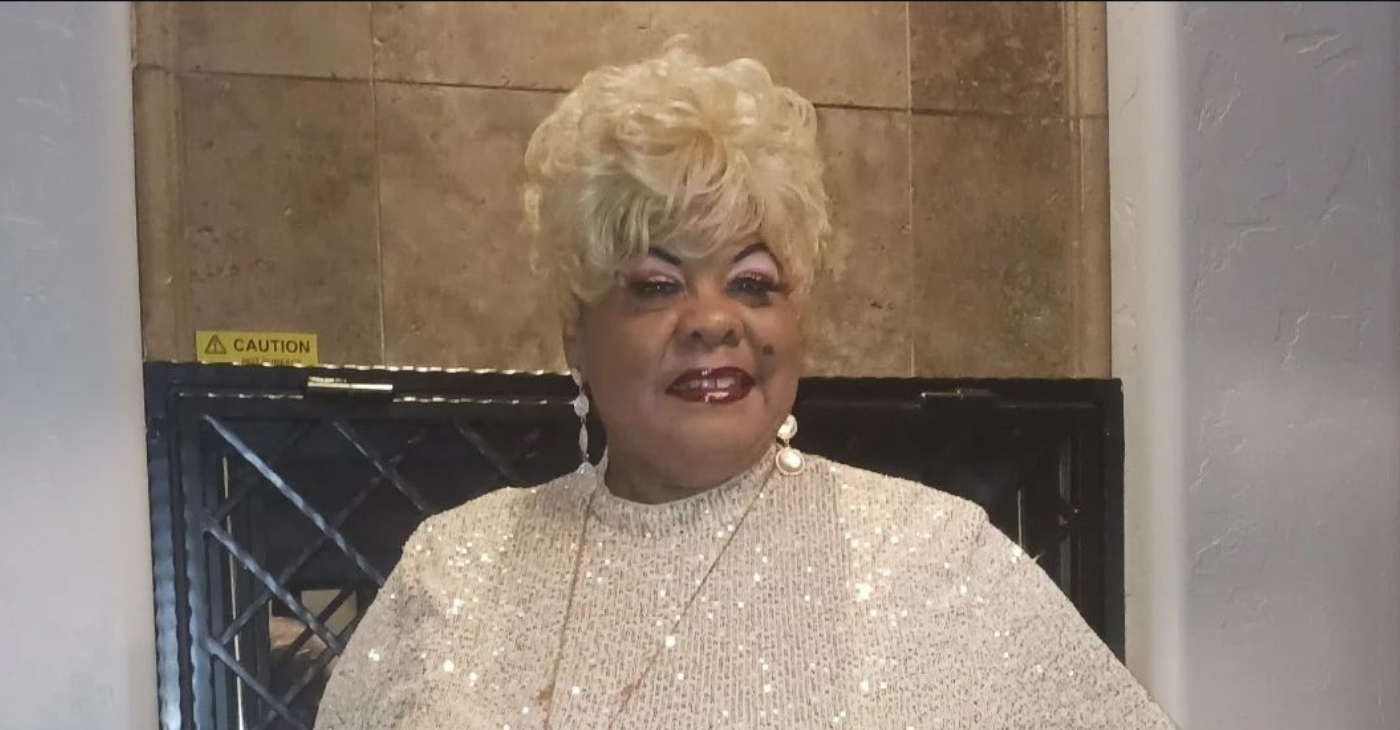
Special to the Post
It was “A Sunday Kind of Love” at the Black Repertory Group Theater in Berkeley on Saturday night, Dec. 7. The one-woman musical based on the music of Etta James featured the multi-talented singer Promise Marks
Marks, who wrote and directed the musical, also owns PM Productions.
“The (show) is a fictional story about a character named Etta, aka Lady Peaches,” said Marks. “She falls in love with Johnny Rhythm, leader of the Rhythm Players Band and headliners of Madam G’s Glitta Lounge.”
Marks channeled the essence of Etta James, singing favorites such as “Sugar on the Floor” and “At Last.”
In between her soulful songs, Marks narrated impactful moments of the love story and journey of blues and forgiveness.
Marks sultry voice carried the audience back to an era that echoed with the power of Black music and a time of great change.
Marks said James shared love for the Black community by singing at gatherings during the Civil Rights Movement uplifting the people.
“She spoke to the movement, spoke to the people, and let her music speak for itself,” Marks said.
Backing the musical’s monologues, images and videos of Etta James are projected for the audience to view. While the production is fictional, Marks infused script with the unfairness and heartbreak James experienced while performing.
Marks performed gospel artist Donnie McClurkin’s “We Fall Down” as she narrated acts of reconciliation and forgiveness among the characters at Johnny Rhythm’s deathbed.
Marks, who regularly sings for the Miss America Pageant, was asked to perform as Etta James last year. “(At the event) a lady yelled out to me: ‘You’re Etta James!’ And then the audience went crazy. I said to myself, ‘I may have something here,’” she said.
Within 12 months, Marks created the musical production, which featured a dozen songs honoring “the great legacy of Etta James,” she said.
Marks says she was saddened to see how Etta James was often judged by the struggles in her life and wanted to offer attendees a more layered view.
“Etta’s life was so big. I want people to know that she was more than her drug addiction,” said Marks. “We can’t make that her legacy. Her catalog is too amazing. You can’t just be that and have the catalog that she (created). I don’t want the addiction to be the focus: I want her music, her element, her sassiness, and what she brought to be the focus – her woman-ness, that she was strong, and I wanted to honor that.”
Set Designer Nora Burnette says she created the set segments to mirror James’ life story. A set designer for BRG since 2016, she explained that her process of researching the scenario and the character serve as her inspiration for her design.
“I try to design a set as close to real life as possible so that the actress can deliver the performance sincerely,” said Burnette. “By creating the right setting, it helps the actors release the true essence of a character.”
The set brought the story to life and absolutely floored Marks. “Once Promise (Marks) saw the actual set, she understood my vision: ‘Wow, you get me. You get it,'” Marks told the designer.
Born Jamesetta Hawkins, Etta James, began her career in 1954 and gained fame with hits such “At Last” and “I’d Rather Go Blind.” She faced a number of personal problems, before making a musical comeback in the late 1980s with the album “Seven Year Itch.”
Co-producer and BRG Development Director, Sean Vaughn Scott, works with Overseer Production. According to producer Pamela Spikes, “Marks talent truly does Etta’s life story justice.”
Pam Jacobs of Hercules, a friend of Marks’ mom, Jackie Smith, said, Marks “was fabulous and sang all of those songs flawlessly.”
“I’m so proud of my daughter,” said Smith.
Marks, who has served as an instructor for BRG, will return on Feb. 21- 23 for an encore run of the musical.
“It’s an honor to be a part of the BRG (Black Repertory Group) family and continue our executive director Dr. Mona Vaughn Scott’s vision for the Black Repertory Group theater,” said Marks.
The Black Repertory Group Theatre is located at 3201 Adeline St., Berkeley, CA 94703. For information, visit: BlackRepertoryGroup.com
Activism
Oakland Post: Week of December 11 – 17, 2024
The printed Weekly Edition of the Oakland Post: Week of December 11 – 17, 2024
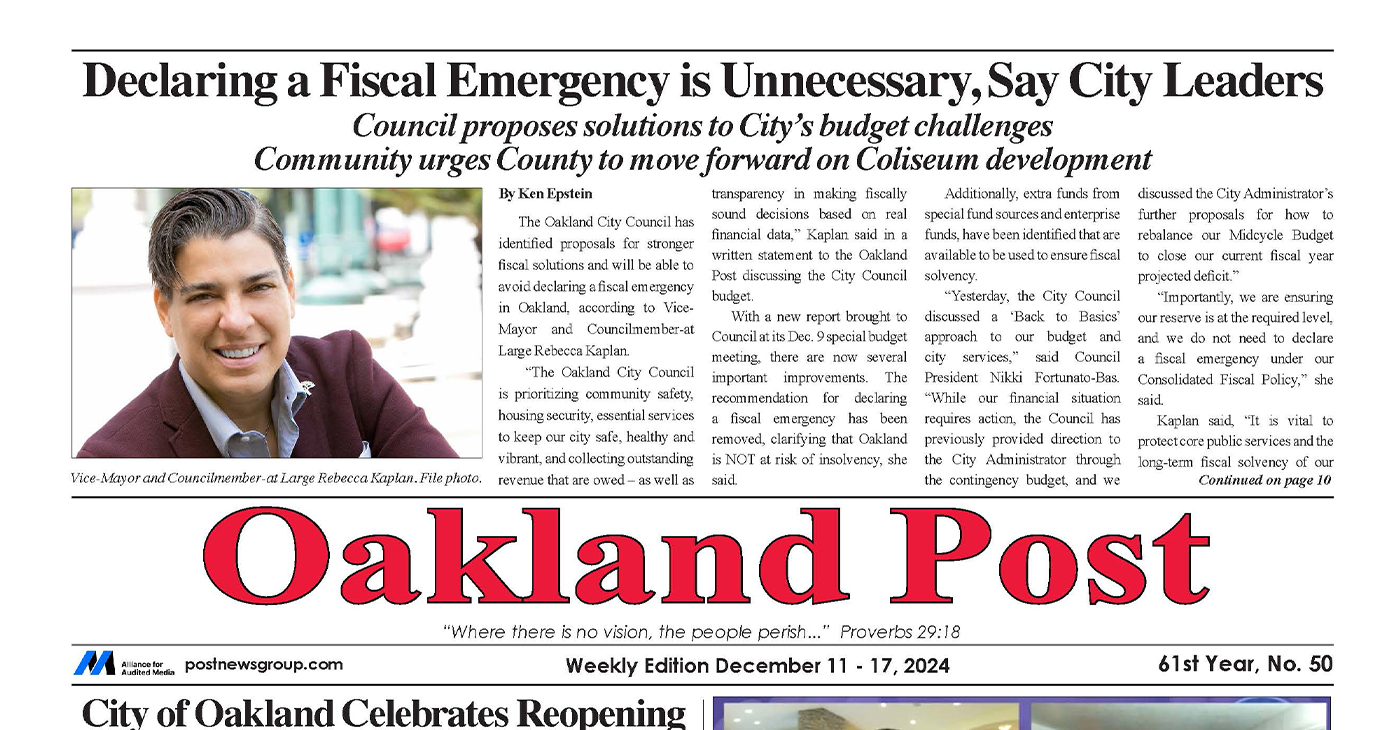
To enlarge your view of this issue, use the slider, magnifying glass icon or full page icon in the lower right corner of the browser window. ![]()
Activism
Black Talk Radio Network’s Recent Podcast Offers Perspective on Nov. 5 Election
“Time for an Awakening” is a Black Talk Radio Network program that runs on Sundays from 7-9 p.m. According to the program’s website, past guests have included Dr. Molefi Asanta, BaBa Ashra Kwesi, BaBa Runoko Rashidai, Dr. Leonard Jeffies, Michelle Alexander. Boyce Watkins, State of Black Farmers series and many others.

Special to The Post
University of Houston Professor of African American Studies Professor Dr. Gerald Horne and renowned speaker and advocate for Pan-African unity, Obi Egbuna Jr, were in conversation on the podcast “Time for an Awakening” hosted by Bro. Elliott and Bro. Richard on Dec. 1.
“Time for an Awakening” is a Black Talk Radio Network program that runs on Sundays from 7-9 p.m.
According to the program’s website, past guests have included Dr. Molefi Asanta, BaBa Ashra Kwesi, BaBa Runoko Rashidai, Dr. Leonard Jeffies, Michelle Alexander. Boyce Watkins, State of Black Farmers series and many others.
With the election in the rearview mirror, Horne, a historian, and author of “The Apocalypse of Settler Colonialism” and “Jazz and Justice: Racism and the Political Economy of the Music,” raised the idea of a Black International Front Conference.
He described proposed locations and the need for independent political organizing in Black communities across the country, with a focus on local elections and alternatives to the direction of Black political leadership.
Joining the conversation in the second hour with valuable information was the External Relations officer to the Zimbabwe-Cuba Friendship Association, and former correspondent to the Herald, Zimbabwe’s national newspaper, Obi Egbuna Jr. A poet and playwright, Egbuna is most known for his passion in creating ties within and among the people and nations of the African diaspora.
He has organized chapters of the Pan African Student Youth Movement in St. Louis, Missouri, Seattle Washington, Charlottesville Virginia and Chicago, Illinois, Egbuna has also written several Resolutions to the United Nations covering a wide range of issues, including HIV/AIDS in Zimbabwe and Police Brutality issues in the United States.
To listen to the podcast, please go to https://timeforanawakening.com/?powerpress_pinw=111154-podcast.
Sources for this story include Wikipedia and Time for an Awakening media.
-

 Activism4 weeks ago
Activism4 weeks agoOakland Post: Week of November 20 – 26, 2024
-

 California Black Media3 weeks ago
California Black Media3 weeks agoCalifornia to Offer $43.7 Million in Federal Grants to Combat Hate Crimes
-

 Activism4 weeks ago
Activism4 weeks agoAn Inside Look into How San Francisco Analyzes Homeless Encampments
-

 Black History3 weeks ago
Black History3 weeks agoEmeline King: A Trailblazer in the Automotive Industry
-

 California Black Media3 weeks ago
California Black Media3 weeks agoCalifornia Department of Aging Offers Free Resources for Family Caregivers in November
-

 California Black Media3 weeks ago
California Black Media3 weeks agoGov. Newsom Goes to Washington to Advocate for California Priorities
-

 Activism3 weeks ago
Activism3 weeks agoOCCUR Hosts “Faith Forward” Conference in Oakland
-

 #NNPA BlackPress4 weeks ago
#NNPA BlackPress4 weeks agoPRESS ROOM: Clyburn, Pressley, Scanlon, Colleagues Urge Biden to Use Clemency Power to Address Mass Incarceration Before Leaving Office




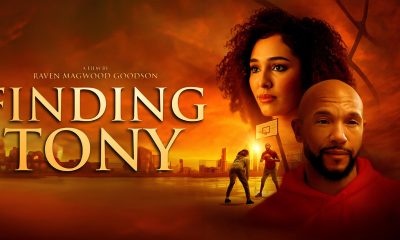

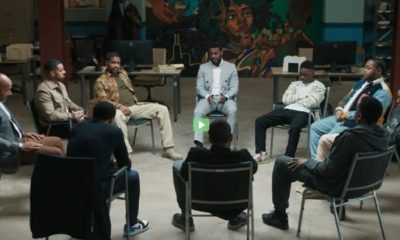

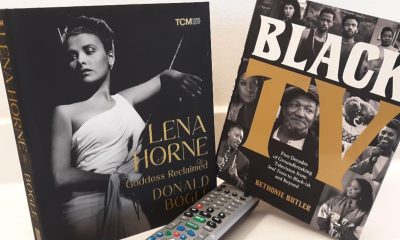

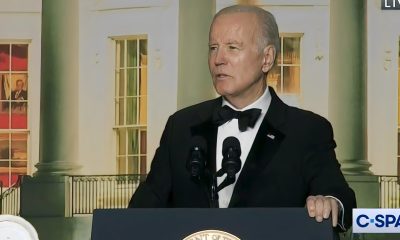



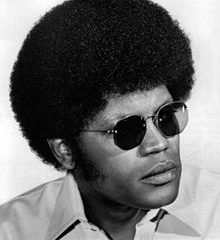














































Pingback: Blue Coaster33
Pingback: Blue Coaster33